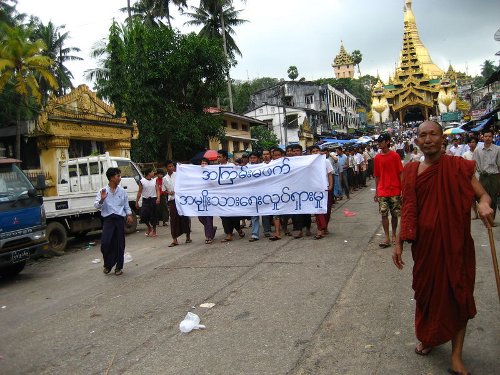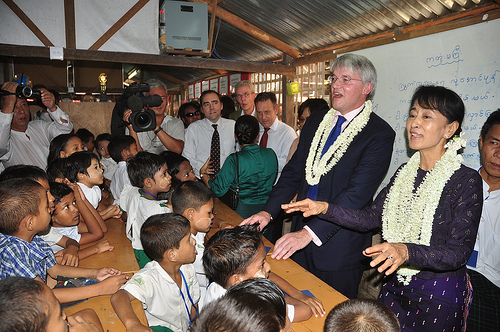Burma, also known as Myanmar, is a nation poised at one of the most important junctures of its short but often tragic history. Since taking office in March last year, the government of President Thein Sein has had considerable success in courting the international community with a flurry of reforms and the pursuance of ceasefire agreements with several armed ethnic groups.
While the current reforms are welcomed and should continue to be encouraged and supported, the success of the transition to a democratic union of Burma is wholly reliant on securing peace between the state and the armed ethnic groups. Without this, the process is sure to fail and life for the majority of people in Burma, particularly for ethnic minorities, will not improve.
Initial ceasefires
Representatives of the government have recently signed agreements with the United Wa State Army (UWSA), National Democratic Alliance Army (NDAA), Democratic Karen Buddhist Army (DKBA), Restoration Council of Shan State (RCSS), Chin National Front (CNF), Karen National Union (KNU), Shan State Progress Party (SSPP) and the New Mon State Party (NMSP).
The government claims the ceasefires are the first steps towards lasting peace, to be followed by the implementation of development projects in ceasefire areas and a comprehensive parliamentary discussion on the peace process, which could involve a Panglong Agreement-style conference.
Efforts to sign ceasefire agreements with other ethnic groups have so far failed and Kachin State is currently experiencing its worst fighting in decades in some areas after a 17-year ceasefire broke down last June. There are also continuing reports of gross human rights abuses by the military against ethnic minorities.
In the 1990s, some two-dozen armed ethnic groups agreed truces with the military government, but these agreements were simply a “pause” on the conflicts, and the underlying political grievances were never addressed. The promised political talks never materialized and the agreements collapsed when the government tried to incorporate ethnic armies into a border guard force – which was heavily resisted. However, the ceasefires did give space for new civil society groups to emerge.
According to the International Crisis Group report ‘Myanmar: A New Peace Initiative’, while hope is high that the current process could lead to lasting peace, there are many hurdles to overcome. ICG said in its report:
While these developments mark one of the most significant moments in the six decades of conflict, lasting peace is still not assured. Ethnic minority grievances run deep, and bringing peace to the country will take more than reaching agreements with the armed groups – it requires addressing the grievances and aspirations of all minority populations, whether or not they are pursuing armed struggleThe new more open political process offers a framework within which these issues could be addressed, but it will require an honest reckoning with the failures of the past and a fundamental re-thinking of the way the country deals with its multi-ethnic make up. A lasting solution to the problem requires going beyond just stopping the wars. Multi-ethnic, multi-lingual and multi-religious Myanmar can only achieve genuine national unity and reconciliation by embracing its diversity
In April, there will be elections, and the opposition National League for Democracy (NLD) will be running for parliamentary seats again for the first time since their landslide victory in 1990 was ignored by the ruling military regime.
It is clear that the country is opening up to more freedoms, with the media freer than it has ever been and opposition leader Aung San Suu Kyi traveling unimpeded and without threat on her campaign trail. It is hoped that the upcoming by-elections will lead to a greater role for Parliament to help bring about peace.
The NLD will hopefully be represented in parliament and will be in a greater position to push for necessary reforms to the Constitution so that it incorporates the views and visions of all parties, including the ethnic groups. This is the role and duty of the Parliament.
Third-party talks?
Some of the ethnic groups have called for third-party talks. The United Nationalities Federal Council (UNFC), an umbrella organization that incorporates most of the ethnic groups, has already complained that the Naypyitaw “regime” has been using military might in suppressing some groups, while luring those who have signed ceasefire with the incentive of regional development in a deceitful attempt to unhinge their struggle for political equality.
There is an issue of strategy going into peace talks, with both the state and the ethnic groups keen to ensure that when they do enter into negotiations, they do so with certain gains already made. In reality, this is already a misstep – as both sides really have the same outcome in mind; a peaceful and unified Burma.
In a recent op-ed published in the Wall Street Journal, Eva Kusuma Sundari, Indonesian MP and President of the Asean Inter-Parliamentary Myanmar Caucus (AIPMC) called for the Burmese government to initiate mediated talks, allowing a third party to bridge the mistrust that has become entrenched over decades of fighting:
For national-level peace talks to be effective and binding, they need to be held in a neutral environment and with the benefit of a neutral third party as host. Burma is opening up—enough so that allowing a third party to organize peace talks follows naturally. Mediation could be arranged regionally, through Asean, or internationally through a U.N.-authorized team involving the EU, U.S. and Asean. Alternatively, an individual host nation, such as Indonesia, could take the lead. The key is to bring neutrality and legitimacy to a difficult process.However, other peacebuilders working with both the government and armed ethnic groups have told Insight on Conflict that a third party would only complicate talks that are already progressing at a very fast rate. This view, they say, has been reiterated by many of the armed groups and the military.Third-party mediation is tested, and has shown results in Aceh in Indonesia, Cambodia and many African countries. If the Burmese regime truly wants peace, and to join the world community on equal footing, inviting a foreign organization to oversee talks will demonstrate its sincerity. This will, in turn, increase trust in the Burmese regime abroad and speed the removal of foreign sanctions and other investment barriers—the regime's ultimate goal.
According to Emma Leslie of the Centre for Peace and Conflict Studies (CPCS), Burma is facing an opportunity to secure lasting peace “like never before”. Once the terms of the ceasefires have been agreed and implemented, the process should move swiftly towards political dialogue, she said.
Whether a third party is involved or not, there is general agreement that genuine political dialogue must be implemented soon if peace making is going to move onto the next step of peacebuilding.
Role of local peacebuilders
The peace process is not simply about brokering a deal between the leaders of the government and the armed ethnic groups, who may have their own aspirations including economic ambitions that may not reflect the needs of the community. For lasting peace, the underlying social-economic and political grievances and aspirations of ethnic communities must be addressed, and this can only be directed by local communities themselves.
Many civil society groups emerged from the ceasefires of the 1990s and they have been carrying out important roles as monitors of the ongoing conflicts and tentative ceasefires. According to Emma Leslie of CPCS, it is the work of these grassroots organizations that have laid the groundwork for the current ceasefires and the opportunity for political dialogue. Some organizations, such as the CPCS, have been helping with communication between parties and working with armed groups on peacebuilding strategies ahead of talks and negotiations.
As the talks proceed, the key roles for local peacebuilders will be in the areas of “monitoring, advocacy and reconciliation processes,” says Leslie, who added that space was being given by both the government and armed groups for these crucial organizations to carry out their work – in some cases, at the request of the ethnic groups.
International organisations do not have access to many of the conflict areas, where local communities and grassroots organisations are already active. There is a danger that an influx of foreign aid could distort local priorities, overwhelming the limited local capacities and marginalising local organisations.
With an influx of foreign aid expected over the coming months, it is important therefore that foreign aid agencies work to engage with communities and community-based organizations in ways which support and empower local agencies, and build capacities.
It is through a broad-based approach which ensures the aspirations and grievances of ethnic communities are addressed that lasting peace can be attained. Hope remains that Burma, which has been at war with its own minorities for six decades, may finally be turning a corner.











